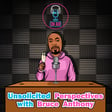
Neurodiversity & Storytelling: Building Bridges with Thomas R. Wilson
Discover the transformative power of neurodiversity and storytelling in this inspiring episode of Unsolicited Perspectives. Host Bruce Anthony sits down with Thomas R. Wilson, the visionary founder of R&H Creative Advocacy and Storytelling, to explore how empathy, creativity, and inclusion can reshape our world.
Thomas shares his personal journey from overcoming trauma to becoming a passionate advocate for the neurodiverse community. Together, they delve into topics like creating safe spaces, designing sensory-friendly events, and using storytelling as a tool for empowerment and connection. Discover the unique perspectives of neurodivergent individuals and learn how sharing stories can foster empathy, dismantle stigma, and build bridges of understanding within our communities.
In this conversation, you'll learn how Dungeons & Dragons fosters community-building, how educators can support neurodivergent students, and why advocacy rooted in empathy is essential for driving change. Whether you’re a parent of a neurodivergent child, an educator, or someone seeking to create more inclusive spaces, this episode offers valuable insights and actionable advice.
Join us as we celebrate resilience, radical accountability, and the human connection through storytelling. This episode is a must-watch for neurodivergent individuals, parents, educators, advocates, mental health professionals, storytellers, and anyone passionate about creating a more inclusive and compassionate world. #Neurodiversity #neurodivergence #adhd #autism #unsolicitedperspectives
🔔 Hit that subscribe and notification button for weekly content that bridges the past to the future with passion and perspective. Thumbs up if we’re hitting the right notes! Let’s get the conversation rolling—drop a comment and let’s chat about today’s topics.
For the real deal, uncensored and all, swing by our Patreon at patreon.com/unsolicitedperspectives for exclusive episodes and more.
Thank you for tuning into Unsolicited Perspectives with Bruce Anthony. Let's continue the conversation in the comments and remember, stay engaged, stay informed, and always keep an open mind. See you in the next episode!
Chapters:
00:00 Welcome to Unsolicited Perspectives 🎙️🔥💥
00:34 Meet Thomas R. Wilson: The Storytelling Advocate 🗣️📖
02:11 From Loss to Legacy: Thomas's Early Life Journey 🌟💔
04:34 Storytelling as a Superpower: Transforming Lives with Words ✍️🔮
10:39 Unlocking the Mind: Understanding Neurodiversity 🧠🧩
13:39 Designing Calm: The Magic of Sensory-Friendly Events 🕊️🎶
20:48 Rolling the Dice: Dungeons & Dragons and Community Building 🎲🐉
25:05 Bridging the Gap: Engaging with Neurodiverse Families ❤️🏠
29:00 A Voice for Change: Speaking Engagements and Advocacy 🗣️📣
30:09 Empowering Voices: Supporting the Neurodiverse Community 💬🛡️
31:13 Smashing Norms: Redefining Program Development 🛠️🚀
35:04 Moments That Matter: Heartwarming Client Stories ❤️✨
38:34 Building Bridges: Partnerships with Charities and Organizations 🤝🤝
41:58 Sharing the Magic: Educational Endeavors on OutSchool and Skillshare 📚💻
46:17 Shifting Perspectives: Public Views on Neurodivergence 🔍🧠
50:45 Words That Heal: Writing for Mental Health and Resilience 📝💪
53:36 A Vision for the Future: Goals and Aspirations 🚀✨
Follow the Audio Podcast:
Apple Podcast: https://podcasts.apple.com/us/podcast/unsolicited-perspectives/id1653664166?mt=2&ls=1
Spotify: https://open.spotify.com/show/32BCYx7YltZYsW9gTe9dtd
www.unsolictedperspectives.com
Beat Provided By https://freebeats.io
Produced By White Hot
